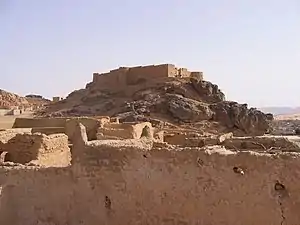| Fortress of Ghat | |
|---|---|
| Ghat, Libya | |
 Fortress of Ghat | |
| Coordinates | 24°58′01″N 10°10′50″E / 24.96702°N 10.18051°E |
| Type | Fort |
| Site information | |
| Open to the public | Yes |
The Fortress of Ghat is a fort on top of the hill of Koukemen in Ghat, Libya. It was started by the Military of the Ottoman Empire and rebuilt in 1930s after partial destruction caused by the Italian campaign against Libya.[1]
Summary
The Fortress was built by the Ottoman Empire during their rule of Tripoli and Fezzan, and it was destroyed by the Italian colonialists who occupied the city in 1913. It is not excluded that the French also used it during their occupation of Fezzan (1943-1952) after defeating the Italians in the last years of the Second World War. It has been rebuilt and is now a distinctive tourist attraction in the city.[2][3]
Location
The road to the top of the fortress definitely passes through the paths of the ancient city of Ghat, ‘Agram’, standing at the top of Ghat Fortress can easily get a bird's-eye view of the city and the nearby palm plantations, as well as the Acacus Mountains, with their charming rock carvings, and golden sand dunes, whereas under the fortress’ western wall there is an underground tunnel that might have been used in emergency situations, such as sieges.[4][5]
Gallery
 Fortress of Koukemen, built in the early 20th century
Fortress of Koukemen, built in the early 20th century Old town of the caravan base, forecourt and city gate
Old town of the caravan base, forecourt and city gate Fortress of Koukemen
Fortress of Koukemen View from the fortress
View from the fortress
References
- ↑ Andrew McGregor (May 2016). "The Strategic Topography of Southern Libya". Aberfoylesecurity.com. Retrieved 19 September 2017.
- ↑ "Ghat | Libya Adventures". 2021-01-01. Retrieved 2021-09-03.
- ↑ "Ghat". famouswonders.com. 2010-05-12. Retrieved 2021-09-03.
- ↑ "Ghat, the city of heritage and beauty | The Libya Observer". www.libyaobserver.ly. Retrieved 2021-09-03.
- ↑ Passon, Jacqueline; Braun, Klaus; Hamid, Said; al-Mahdi Khalifa, Salih; as-Sadeq at-Tellisi, Najmiya; El Nayedh, Mansour; Metzger, Joschua (2020), Braun, Klaus; Passon, Jacqueline (eds.), "Places of Trade, Communication and Religion—Important Oases", Across the Sahara: Tracks, Trade and Cross-Cultural Exchange in Libya, Cham: Springer International Publishing, pp. 165–247, doi:10.1007/978-3-030-00145-2_6, ISBN 978-3-030-00145-2, retrieved 2021-09-03
